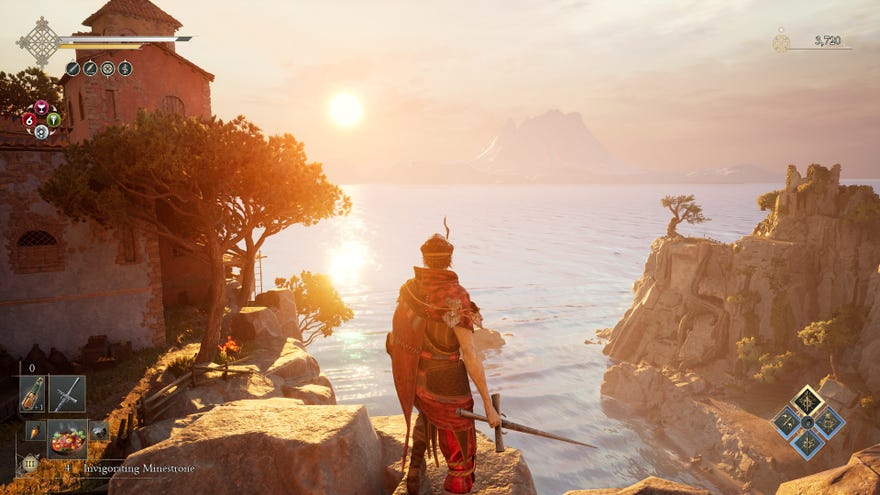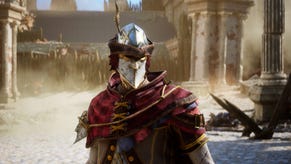Enotria: The Last Song review: a straightforward, sunny Soulslike
Bugs aside, this is a refreshing AA monster-basher
When playing a new Soulslike, there’s an element of translation involved while you figure out the language of the game. What are the upgrade materials called? What’s the equivalent of poison? What are experience points and checkpoints called, although you’re going to call them souls and bonfires anyway? I’ve done this many, many times, but on this occasion there was a surprising twist, one which would have notorious pearl-clutching racist HP Lovecraft spinning in his grave. Enotria: The Last Song’s arcane Soulslike language is actually just Italian.
I’m not just pointing this out because there’s something amusing about an Italian developer making a game in Italian and only translating some of it, but because Enotria’s worst trait is that it obfuscates its interesting systems by not explaining them. Or explaining them once, early on when you’re still trying to get to grips with the basics, and expecting you to remember them for the entire game. This is in spite of the game including an extensive compendium with a tutorial section, because it records just half a dozen of the most basic bits of information before giving up. Want to know background details of every enemy type in the game? No problem! Need to bone up on what, exactly, the Gratia status effect does? Tough luck!
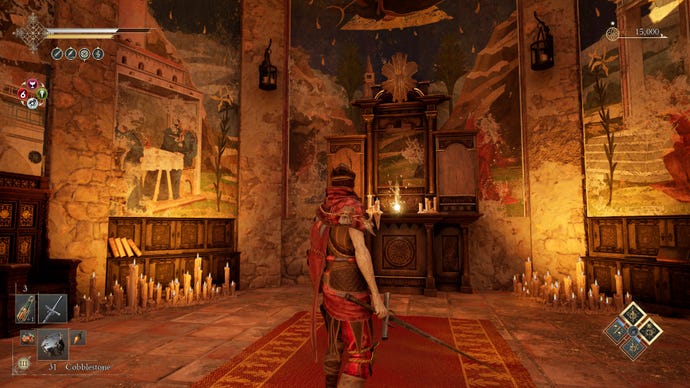
It’s a real shame, because Enotria has a lot to recommend it. It’s genuinely gorgeous and the setting is inspired, drawing on a variety of Italian cultural touchstones, from Ancient Rome to the canals of Venice. The environments immediately set it apart from most of its genre mates, eschewing the dark and dreary for the bright and cheery. The starting zone of Quinta moves from lush, golden wheatfields to a town locked in perpetual carnival, while elsewhere we see sun-bleached Mediterranean cliffs and soaring Roman columns. Even the more shadowy zones are colourful in their own way, with the nighttime cityscape of Litumnia rendered in darker shades that are still rich and evocative.
Enotria’s inhabitants, the vast majority of whom are humanoid, are locked into their masked roles by means of a vast enchantment meant to create a perfect world, but instead causing stagnation and madness. As well as providing the customary reason why everyone is wandering around, waiting for you to come and put several feet of steel up ‘em, the masks provide part of the characterful customisation and upgrade system.
The protagonist is Maskless, having no role of their own, instead able to assume any role by donning the masks of the defeated (bosses tend to drop their whole masks, while regular enemies drop shards that you can grind for, if you so wish.) Masks provide a variety of effects, such as boosting specific attack types, or giving you extra healing items. On top of that, there is an extensive skill tree, dozens of spells and weapons, and stats that are increased in typical one point per level fashion.
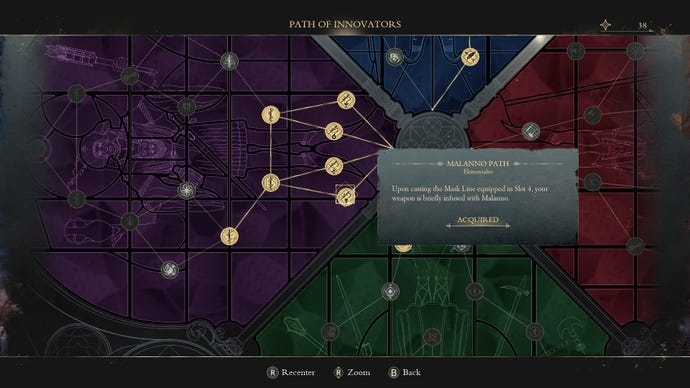
Of all the From Software Soulsbornes, the resulting combat hews closest to Bloodborne (insert obligatory “PC version when?” comment.) The assorted weapon types (hammers little and large, swords in four degrees of biggitude, plus polearms) don’t change up combat much and since spells require fisticuffs to charge up, even the most melee-shy mage is going to have to get stuck in sometimes. Your defensive options are dodging and parrying, and the relatively short dodge distance combined with the fact that you can parry absolutely everything (swords, dogs, cannonballs, giant boulders thrown at you by giants) means that parrying is often the better option.
It’s when you introduce skills that things get interesting. There are four trees that roughly correspond to straight-up melee, spellcasting, rogue stuff and elemental gubbins. You can pick up an array of skills pretty quickly and I must have had over half of them unlocked by the end of the game, but you can only have six slotted at once. Combined with complimentary masks, they allow you to tweak your playstyle much more than simple weapon choice does.
I went with a sort of sword mage build, buffing my weapons with elemental enchantments and choosing supporting skills that increased my power whenever one of my enchantments was running, or when an enemy was afflicted with a status effect. This proved to be a good decision, as it meant constantly tweaking my loadout to best deal with the selection of enemies in a given area, or tinkering to find the best build for beating a boss. Thankfully you can have three different loadouts at a time and can switch between them on the fly.
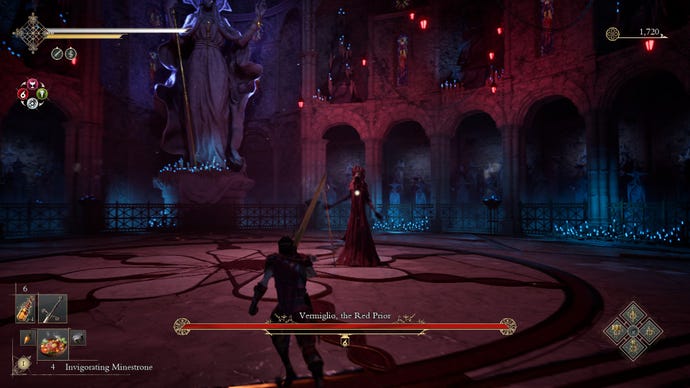
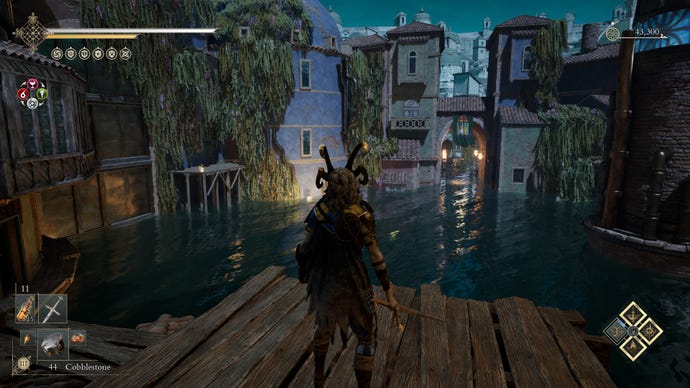
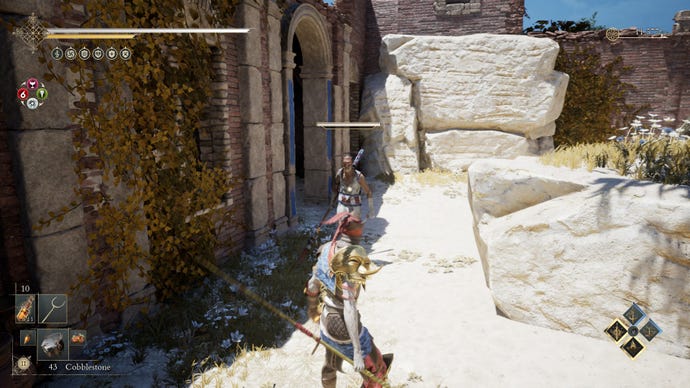
Enotria’s status effects are worth calling out, because of an elegant implementation that adds a layer of strategy beyond typical “water beats fire” elemental interactions. There are only four elements in the game, each with a corresponding status that has both a positive and negative effect. Vis, which as far as I can tell is supernatural drunkenness, increases your damage output and stamina recharge rate, but lowers your defences. Gratia, on the other hand, grants healing over time, but build up too much and it explodes, tearing off a big chunk of health.
It’s unfortunate that it seems all too easy to bypass these systems entirely. Choose a build that relies on physical or vanilla magical damage instead of elemental types and it’s possible to play through most of the game with a single weapon and loadout, not really having any reason to branch out. While the core combat is solid, the occasional stuck camera issues aside, it doesn’t have enough depth or variety on its own and I can see how such a play style would quickly become repetitive.
That said, a more straightforward build would avoid running into Enotria’s aforementioned poor explanations too much. Spells, or “lines”, all charge up at different rates. There’s no mana equivalent, you just wail on enemies until one of the spells in your four slots accumulates enough juice to be cast. Each spell description specifies how quickly it charges, but in Italian (I wasn’t joking about it being helpful! I muddled through thanks to half-remembered childhood music lessons, but if you don’t know your presto from your allegro, you’re out of luck.
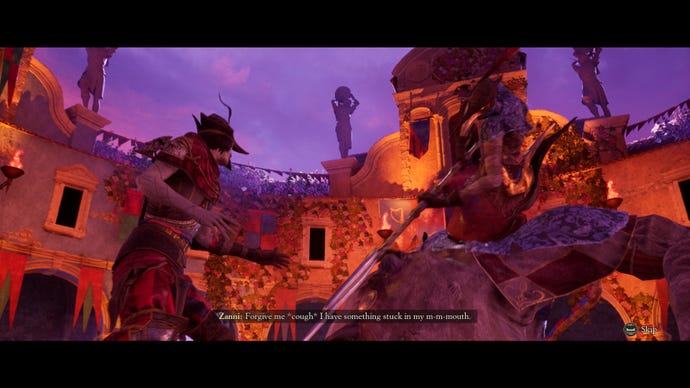
This poor communication extends to other areas too. After defeating the big boss at the end of each zone, you’re briefly shown where to go next. Hopefully you recognise the location and exactly where it is, otherwise you’ll be spending a considerable amount of time running around trying to find it. There’s no map, which generally isn’t a problem, but when you’re trying to find a specific door that has now unlocked, it would be really helpful to have some kind of reference.
It’s also quite buggy. In the 25 hours it took me to get through the game, I encountered a variety of issues including NPC conversations getting stuck and controls locking up, along with a couple of crashes. Performance issues cropped up, with occasional stutters and persistent screen tearing that I could just not get rid of. Worst of all was the final boss just freezing up on one attempt, allowing me to just beat on him and skip his final phase entirely. Little bit anticlimactic, that. Jyamma is aware of many of the issues and already working on fixes, but it strikes me as a bit off to move the release date of a game forward (it was brought forward while I was working on this review, so some of my time was spent with the launch build) when you’re still fixing problems.
These issues aside, I had a great time with Enotria. Coming off of playing hundreds of hours of the sprawling Elden Ring, particularly the DLC, it was refreshing to play a Soulslike with a more manageable length and back to basics approach. The unusual setting and beautiful, appropriately shortcut-stuffed environments were a delight to adventure through. While you have to actively embrace the intricacies of the systems on offer, they’re smart, inventive, and I hope to see some of the ideas built on in the future. Enotria is the epitome of the AA game, with all the good and bad that comes with it.
This review is based on a review build of the game.